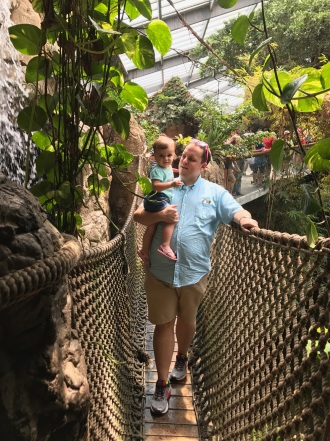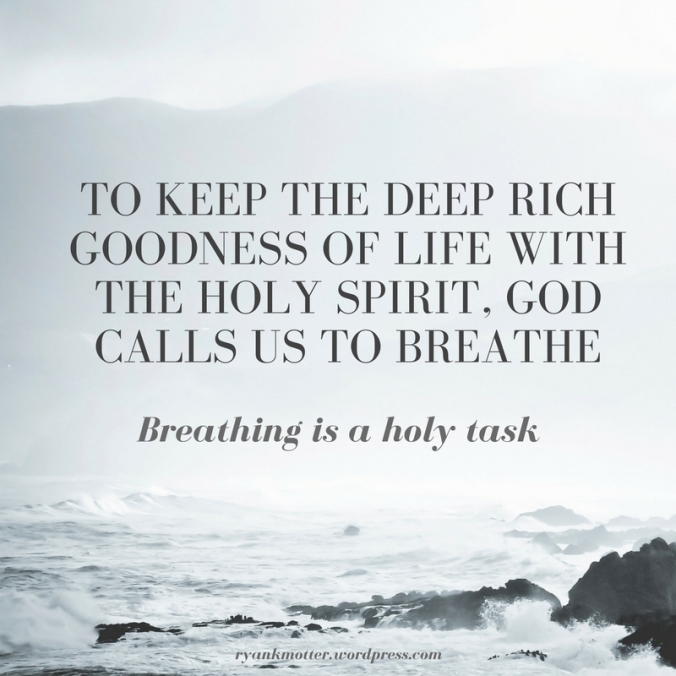He couldn’t have chosen a better day to have a stroke.
That was one mantra that got us through the first few days. We’d repeat it to everyone who came, with the litany of things we had celebrated in the days before his brain hemorrhaged.
Because really, what can you say when you’ve repeated the story 100 times to anyone who will listen again?
On Sunday before the stroke, Suzanne and I celebrated our installation at the church we had just started serving the summer before. The church was proud and so were we and so was he. We had a grand time with friends in from out of town, and Dad took all of us out afterwards, celebrating with chips, salsa, queso and tacos.
The next morning, Labor Day, we all gathered to celebrate Dad’s second granddaughter’s first birthday. I have this picture of him sitting on one side of the back deck, blowing bubbles with our girls, a picture we would pass around often in the days when Dad was unresponsive.
He couldn’t have chosen a better to day to have a stroke…after celebrating both of his children and cherishing his grandchildren in grand celebrations of life.
Back to that installation service- I had only asked for a few things to be included in the service, but I wanted “His Eye is On The Sparrow” sung or played. It’s a carrying tune for our family- it was played at both of my father’s parent’s funerals, it was played at our wedding, and it was included in my ordination service. If some songs are on our soundtrack, this song is my anthem.
I hope you’re singing it in your head now, “I sing because, I’m happy. I sing because I’m free. For his eye is on the sparrow, and I know he watches me.” You’ll know you’re most like our family if you were singing Lauryn Hill and Tanya Blount’s version from Sister Act 2…
The incomparable Lori Tucker, one of the Wild Women of Kansas City, came to sing Sparrow at the installation. When Lori sang Sparrow that day, she came to the chorus, the “I sing because I’m happy” part. Her voice slowed and she clasped a hand to her chest, reaching for invisible pearls; she closed her eyes, smiled and prayed the words more than sang them, “I sing because I’m free.”
It was a moment, one of the seldom ones, where someone is so completely giving away what they have that you feel immersed, enveloped, in the intensity and truth of it; it’s a moment sitting in the sun glow of love. As she sang, Lori brought her hands away from her invisible pearls, swinging them out as though amplifying waves of her joy, casting them out on us.
Back to the hospital- in the early days, the neurologists, neurosurgeons, and rehab specialists told us that music was a unitive force, that music required executive function from both hemispheres of the brain and that, given our family’s love for music, Dad could benefit from it. A friend of Dad’s brought a small boom box to the room with a box of inspirational and religious CD’s, and we invited friends with willing (if not necessarily good) voices to sing to Dad.
Whenever it was me, alone with him, though, I could only think of one song to sing.
It was all I could do to choke out the chorus through tears…I sing because I’m happy…
I choked through the words because I wasn’t happy. I choked through the words because I worried that the next time they would be sung would be at his funeral. I choked through the words because I was exhausted and angry and afraid and overwhelmed and…
I still sang them. Because in them somewhere was some small pearl of mercy that I needed.
There’s a song we sing in church, I often sing it when I pray. The chorus is simple: No storm can shake my inmost calm, while to that rock I’m clinging. If Love is Lord of heaven and Earth, how can I keep from singing?
Music breaks in because, how can I keep from singing? The lyrics of the music change from moment to moment, though: I’m broken wide open. I’m shattered. We’re hopeful. We’re hopeful but terrified. We’re so scared. Things seem to be better today. Things are so much worse today. The doctors think things are working. The doctors don’t know if anything can help. There is no treatment. He has to be strong. We have to be strong.
Back to church- Lori Tucker was back at the church a few weeks ago to sing. I went to her because my heart still resonated with that sun glow blessing she had cast froma year ago. I needed to go to her. Embracing me, she smiled great big and said, “Baby, how have you been? How’s your Dad?”
I told her about Sparrow, about singing it to Dad and about how we were just past the year anniversary of the stroke, how her faith in the song had carried me in those first days. She listened and her eyes filled with tears as I told her I’d try to sing it to Dad.
And then Lori told me more about her husband. Lori’s husband Ham is with her when she sings, partly because he loves her so deeply and loves to hear her sing and partly because seven years ago he had a stroke similar to Dad’s that placed Lori in the role of his primary caregiver.
Lori told me about the weeks Ham was on life support and how she’d sit just like I did singing Sparrow to him. She said this, “When we were in the hospital, I only prayed for one thing: I said, Lord, I don’t know what will happen, but I know that you will heal my heart no matter what.”
“I know that you will heal my heart no matter what.”
Then Lori got up that Sunday and sang, “We have come this far by faith…Leaning on the Lord…”
Faith is singing the sparrow song, the one you sing when you aren’t sure if you can get the words out. That’s all it is.
Faith is the tiny pearl of mercy there when we forget the words to the songs, when we can’t choke out the words, when our only prayer is for the broken heart we hold in pieces saying “heal this.” It’s the persistent willfulness we have to put one foot in front of the other, to take whatever words there are and say, “these are going to have to be enough.”
When Lori sang just a few weeks ago, with the words, “We’ve come this far by faith,” it felt like sparrow words that had carried us forward and are still carrying me today in many ways. And all I could do was be grateful that they were enough because they were all the faith we could hold.
And if you need sparrow words today, you can hear it Lori sing “We’ve Come This Far” with Father Timothy Whitmer on the keys by clicking right here.

 Now, the dark purple couches are the chosen spot for our sweet medium-sized white-haired dog to do all her shedding and for our grubby twenty-month-old to wipe the veggie straw crumbs off her fingers. Just like I say, “We were going to get new couches,” I could sum up this phase of our life together with any number of other similar statements: “I wanted to go to that writing workshop last year, but it was, like, two whole days long,” “The film fest sounds fantastic but do they have some kind of childcare?,” “Yeah, we went to the Auto Show to look at minivans.”
Now, the dark purple couches are the chosen spot for our sweet medium-sized white-haired dog to do all her shedding and for our grubby twenty-month-old to wipe the veggie straw crumbs off her fingers. Just like I say, “We were going to get new couches,” I could sum up this phase of our life together with any number of other similar statements: “I wanted to go to that writing workshop last year, but it was, like, two whole days long,” “The film fest sounds fantastic but do they have some kind of childcare?,” “Yeah, we went to the Auto Show to look at minivans.”
 recipe. A few years ago, I baked the honey whole-wheat bread almost every other day. I knew that in these first days of Sabbatical, I wanted to make the bread again. But, I couldn’t remember the recipe.
recipe. A few years ago, I baked the honey whole-wheat bread almost every other day. I knew that in these first days of Sabbatical, I wanted to make the bread again. But, I couldn’t remember the recipe.